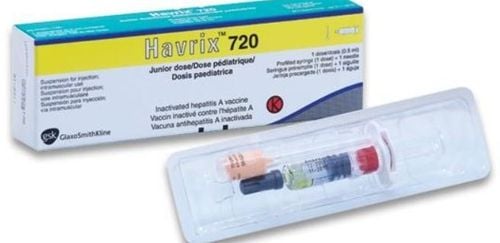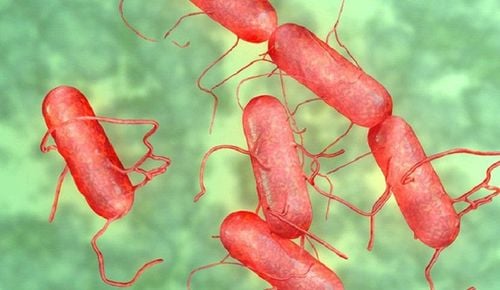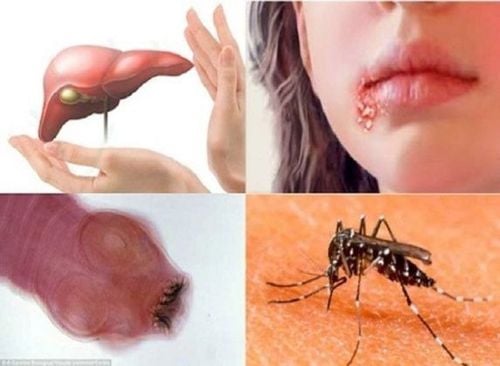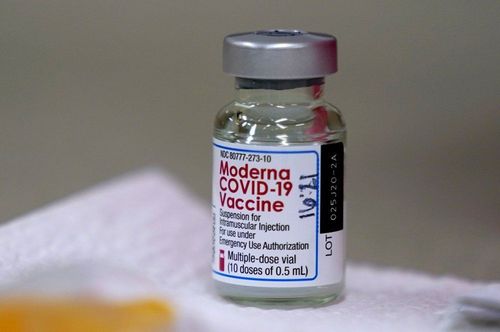This is an automatically translated article.
Typhoid is an acute infectious disease causing epidemics that cause systemic infection, especially damage to the gastrointestinal tract. If the patient is not diagnosed and treated promptly, it will cause many dangerous complications, even injury.
1. Overview of typhoid disease
1.1. Concept Typhoid is a disease caused by the bacteria Salmonella typhi and Salmonella paratyphi. In which, bacillus Salmonella typhi is a non-spore forming gram-negative bacillus that grows easily in normal culture medium, bacilli have 3 main antigens: O, H and Vi. The clinical signs of bacilli are prolonged fever and many complications, especially gastrointestinal bleeding and intestinal perforation.Salmonella is a gram-negative, hairy bacillus with good resistance to outdoor environments; in the soil live for several months; in water and feces live for several weeks; in frozen foods for 2 - 3 months and live in foods with high salt concentrations; At 1000C, it takes more than 5 minutes to kill. Once in the body, Salmonella will grow and reproduce in the small intestine and enter the bloodstream after entering the stomach acid barrier. White blood cells have the role of transporting bacteria to the liver, spleen, and bone marrow. The bacteria will multiply exponentially when entering the gallbladder, bile duct system and lymphoid tissue in the intestine.
This is an acute infectious disease, the routes of infection are:
Ingestion: bacilli are excreted in feces at all stages of the disease, especially in the incubation period. The bacillus is transmitted by ingestion of contaminated water or food. In addition, bacilli are also transmitted through urine, sputum, and vomit. In many cases, patients carrying bacilli have no symptoms, clinical manifestations, so it is difficult to control and sick people. According to statistics, the number of patients who have recovered clinically but still continue to carry bacteria for months and years after that due to bacteria residing in the biliary tract and intestinal tract is 3-5%.
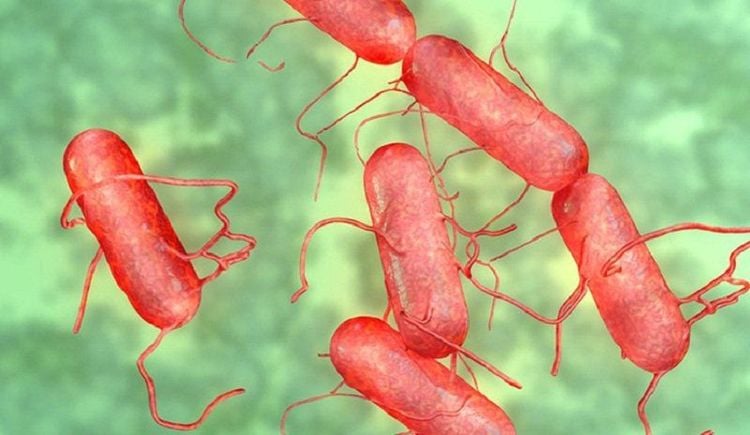
Trực khuẩn Salmonella gây ra bệnh thương hàn
Fever: Typhoid fever is very common, can be high fever from 39-40 degrees Celsius. Accompanied by fever symptoms, the patient will have discharge. additional signs of headache, insomnia, tinnitus, slurred speech, to the state of lying motionless indifferent to the external environment, then lethargy, delirium or coma (uncommon). Appearance of erythema: ie small maculopapular 2-3mm, pink color usually grows on abdomen, ribs, chest Liver damage: soft, enlarged abdomen, pain along right iliac fossa, passing stool about 5-6 times /day, the stools are yellow-brown, especially the smell is very bad. Slow pulse relative to blood pressure, low blood pressure.
2. Why does typhoid cause complications?
Typhoid fever, if not detected and treated promptly, will cause very dangerous complications in the gastrointestinal tract, cardiovascular, urinary tract, brain...With the advancement of medicine, many good antibiotics was born, reducing the complication rate but some cases still encountered. Complications are caused by toxins, other bacterial superinfections, and antibiotic complications.2.1. Gastrointestinal complications The gastrointestinal complications that patients often encounter are: gastrointestinal bleeding, intestinal perforation, hepatobiliary complications...
Gastrointestinal bleeding usually occurs in the 2nd - 3rd week of the disease. . The disease can go away on its own, but it is also accompanied by more severe symptoms such as: rapid pulse, low blood pressure, blue skin, abdominal distension, black stools. About 15% of patients have gastrointestinal bleeding complications.
Intestinal perforation: causing severe abdominal pain in the right iliac fossa or spreading throughout the abdomen, rapid pulse, low blood pressure. On examination, there is a reaction to the abdominal wall, palpation of the peritoneum, and loss of the pre-hepatic opacity. The disease usually appears in the 2nd - 3rd week of illness.
Hepatobiliary complications: hepatitis, cholecystitis...
2.2. Cardiovascular complications Cardiovascular complications caused by typhoid include: myocarditis, cardiovascular collapse; thrombophlebitis of the arteries and veins; pericarditis.
2.3. Urinary tract complications include: glomerulonephritis, pyelonephritis, glomerulonephritis, acute renal failure.
2.4. Localized organ infection Meningitis purulent , pyelonephritis...
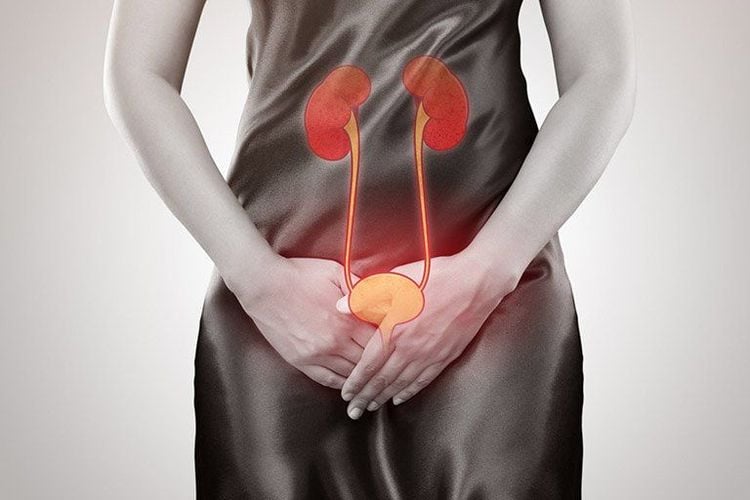
Viêm đài bể thận là biến chứng của bệnh thương hàn gây ra
3. Prevention
To prevent the disease, it is necessary to first treat healthy people who carry the infection, isolate and treat the patient's waste, and vaccinate them.In addition, it is necessary to improve environmental sanitation, control water, waste, sewers, disinfect water sources, need to be disinfected with chloramin B solution, lime powder. In places where typhoid occurs frequently, vaccination with a vaccine, depending on the effectiveness of each vaccine, can be repeated after 2-5 years.
Vinmec International General Hospital is currently implementing typhoid vaccination service:
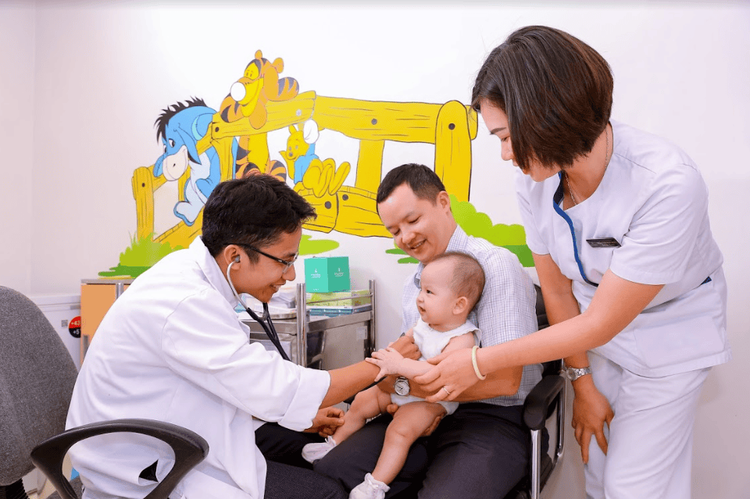
100% trẻ được khám sàng lọc trước tiêm chủng
Children will be examined by pediatricians - vaccines, fully screened for physical and health problems, advised on preventive vaccines and injection regimens, how to monitor and care Before vaccination, children are vaccinated according to the latest recommendations of the Ministry of Health & World Health Organization to ensure the best effectiveness and safety for children. A team of experienced and professional pediatric doctors and nurses, understand children's psychology and apply effective pain relief methods for children during the vaccination process. 100% of vaccinated children were monitored for 30 minutes after vaccination and reassessed before leaving. Undertake medical supervision before, during and after vaccination at Vinmec Health System and always have an emergency team ready to coordinate with the vaccination department to handle cases of anaphylaxis, respiratory failure - circulatory arrest, ensuring Ensure timely and correct handling when incidents occur. The vaccination room is airy, with a play area, helping children feel comfortable as if they are walking and have a good mentality before and after vaccination. Vaccines are imported and stored in a modern cold storage system, with a cold chain that meets GSP standards, keeping vaccines in the best conditions to ensure quality. Parents will receive a reminder message before the vaccination date and their child's vaccination information will be synchronized with the National Immunization Information System.

Trung tâm tiêm chủng vắc-xin - Bệnh viện Đa khoa Quốc tế Vinmec
Particularly in December 2019, Vinmec offers free newborn Hepatitis B Vaccine (immunization right after birth) for babies when registering for the Package Immunization Package for children aged 0-1 or 0-2 year old .
To register for child vaccination, please contact directly to Vinmec Health System nationwide or book an appointment HERE.
MORE:
Injectable dose, schedule of typhoid vaccination Typhim Vi vaccine (Sanofi, France): Uses, dosage, side effects Possible reactions after typhoid vaccination





